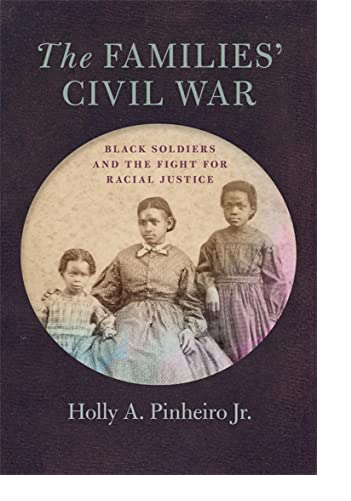
Holly A. Pinheiro, Jr.’s The Families’ Civil War: Black Soldiers and the Fight for Racial Justice begins and ends with women of different generations defending their right to the pensions earned by loved ones who served in the Civil War.
One laments, in 1884, the abandonment she felt by the U.S. government. The other, in 1939, pleaded directly to Eleanor Roosevelt, wondering why her dying mother was denied her father’s pension.
“There’s such a beauty in that moment, that this woman is demanding to be remembered, and also is basically making the point that, ‘I am a living monument to the Civil War. I am the daughter of someone who gave his life for this country,’” Pinheiro said.
Pinheiro is the featured speaker for The Library’s Hari Jones: Hidden Histories Program Series presentation on November 16.
His book chronicles the decades-long fights waged by the families of Philadelphia’s African American Civil War soldiers against prejudice and a bureaucracy indifferent or hostile to their pension claims. The story reveals the systemic racism and oppression that strained families and blocked their economic advancement.
 The Hidden Histories Series honors Hari Jones, the late historian whose groundbreaking work focused on the role of African Americans in the Civil War. As a member of the National Civil War Museum board and presenter of the museum’s award-winning lecture series, “The Lost Story,” in 2015, he advocated using primary sources to reveal truths in American history.
The Hidden Histories Series honors Hari Jones, the late historian whose groundbreaking work focused on the role of African Americans in the Civil War. As a member of the National Civil War Museum board and presenter of the museum’s award-winning lecture series, “The Lost Story,” in 2015, he advocated using primary sources to reveal truths in American history.
Pinheiro’s family-centric approach to history aligns with that of Jones and the Hidden Histories Program Series, said Ashley Famularo, The Library’s Adult Programming & Outreach Coordinator.
“Hari himself had an interest of going back to areas of history and piecing together a fuller story of that history,” she said. “We wanted to keep that goal alive and celebrated by bringing in different presenters, whether they knew Hari personally or not, who are also involved in that work of expanding our idea of American history.”
Pinheiro’s interest in the Civil War’s Black military families stems from his upbringing in a military family and his self-proclaimed “obsession” with the characters in Glory, the 1989 film about the 54th Massachusetts Infantry Regiment, and their “fight for agency.”
“Who were these people?” Pinheiro said. “Who were they a decade or more before they ever enlisted? Did they have jobs? What kinds of jobs? What is their family structure?
“The more I dug into their pre- and post-war lives], the more I really understood that these Black families, and Black people in general, have been fighting for equality from the second they were born,’’ he said. “In some instances, [fighting] even after they were long gone, whether through their descendants or their communities.”
One reader thanked Pinheiro for following an ancestor – the wife of a USCT soldier – whose life had been “erased from the historical narrative.”
“She basically said, ‘You’ve done justice to her story because you’ve given her a voice that was silenced for 100-plus years,’” he said. “When I read that email, I cry because that’s the validation I’ve always dreamed of. I wrote this for her and for people to know that your families matter, too.”
The primary records Pinheiro relies on have always been here, although many were produced “through a filtered White lens and voice.” Many Black Philadelphians seeking pensions struggled to prove to White bureaucracies their familial connections to “fictive kin” – a family formed without blood ties or marriage but devoted to each others’ support and survival.
“I wanted to put more agency on the community and their definition of the relationship, rather than their oppressors’ view of them,” Pinheiro said. “If we continue to use those racialized, patriarchal lenses, then we are basically amplifying historically the negative connotations about these people.”
Those kinds of insights demonstrate how the Hidden Histories Program Series snugs neatly with this year’s expansion of McCormick Riverfront Library and its goal of illuminating the lessons of history that resonate today, said Famularo.
 The Families’ Civil War has also been added to the Hari Jones: Hidden Histories Collection of resources about African American history and life, and to the T. Morris Chester Welcome Center and Research Collection devoted to “discourse that advances unity, peace, equity, and justice.”
The Families’ Civil War has also been added to the Hari Jones: Hidden Histories Collection of resources about African American history and life, and to the T. Morris Chester Welcome Center and Research Collection devoted to “discourse that advances unity, peace, equity, and justice.”
“The Hari Jones series ties in with The Library’s goal to nurture community conversations and learn from one another,” said Famularo.
By presenting in libraries and other publicly accessible places, Pinheiro tries to give a wider audience glimpses into the history of women and Black Americans that has been long documented but little shared or analyzed from the perspective of Black families.
“There are more people that are going to engage with this history in a way that it should be,” he said. “The influence that libraries have is going to do more than any college course I teach because of the number of people that come through those spaces.”



